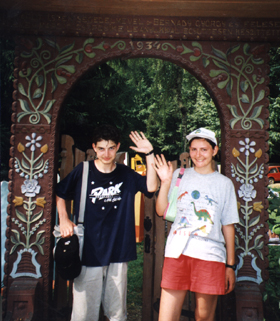

Thursday, August 6: Spent an enervating but enjoyable day on a bicycle, pedaling several miles down dirt roads on a model built for a ten-year-old, with ludicrously small tires. First stop was the salt mine in the town of Praid. Praid is a depressed-looking place, a bit of a Wild East town; it was here I stopped into a bar and paid 2000 lei (then about 23 cents) for a "cappuccino" made from a packet of powder and sipped from a squat glass emblazoned with the logo of King George IV Old Scotch Whisky White Label. On the walls of the bar were stuffed birds and the skin of a wild boar, and assorted skulls and antlers.
Praid's salt mines are a major area tourist attraction. Signs in Hungarian and Romanian hang over the entrance wishing good luck to the miners, which I'm sure they need. Tour groups queue up outside (including, I notice, an assemblage of Israelis). Taken 2700 meters down in special tram cars, we are dropped off in a cool environment (55 degrees F or so) where the salt- laden air, unlike the atmosphere in coal mines, is reportedly healthy for the lungs.
According to the guides, salt mining began in Praid during the Roman Empire; the Salt Road started here and led to Rome. All the mining was from the surface, however, as excavations didn't begin until 1762. All the rooms are carved out of rock, of course, gray and squarely cut. The ground is damp, grooved, and gritty with salt underfoot. The extensive caverns boast an entire underground rec center where kids play, in this surreal setting, on swings and other equipment; there's a ping-pong table, a sandbox...the kids punch at large balloons in the dim fluorescent light.
There are picnic tables and rocking chairs for the adults. Elsewhere, there's even a rough-walled chapel with backlit stained glass and simple wooden pews (though the movie theater is history), and, no surprise, trinket- sellers ply their trade at side tables. Though tour groups wouldn't know it if they weren't told, miners are still active here -- six levels below us.
Back on the surface, bypassing the craft stalls, we enjoy a Székely/Hungarian specialty called a kürtös (pron. KOOR-toash), a sort of large, hollow, hard, sugar-dipped cruller, straight rather than curved, and which I found addictive (tough luck; they're pretty scarce in Slovenia). Although they cost only around 30 cents apiece, Csongi remarked that given the average Romanian's salary, certainly including an OB guide's, of 125 to 150 dollars monthly, they're regarded as a rather special treat. (The average Romanian's purchasing power has since fallen to even less, given Romania's inflation rate of 40.6% in 1998 and nearly 55% in '99, combined with the lei's fall against the dollar from 8750 in August '98 to over 18,000 in February 2000. Yes, things really are that tough over there.)
Then off on the bikes again, passing countless horses and carts along rolling, terraced hills, to nearby Corund -- or Korond, as it's known to the Székelys who make up the entire population of this craft village, one of the most prosperous places in Transylvania. Korond seems to produce nearly all of the folk souvenirs in Romania, and plenty of items which I later see for sale at inflated prices in the Budapest central market. (There are coach tours to Korond from Hungary.) Ceramics, some of them masterpieces of folk handicraft, are the main cottage industry in this one- dirt-road village, but there are also plenty of sweaters, leather vests, wicker baskets, toys and other tourist tchotchkes. I buy plenty of small pieces for true pittances, plus a rough-textured but attractive wool sweater for about eight dollars.
Having only barely made it to Korond on that ridiculous bike, I informed Attila that I had pedaled enough for one day, which he took equably, and rode back in the van that had followed us, along with Adriana, Szilárd and András (the latter of whom had suddenly taken ill).

A nearly full moon rose over the campsite at a bit past nine p.m. The heat of the day finally dissipated. Our group still awaited Leo's, who, alarmingly, were still off on their own bottle hunt. Finally, Attila and one or two other guides went off on a search party and finally found them; it turned out that they had gotten seriously lost.